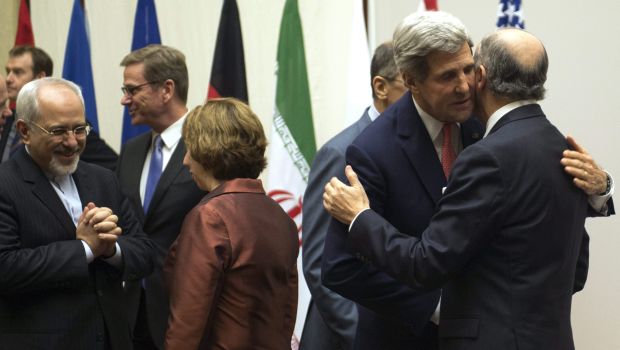Some Syrian revolutionary figures said the Syrian public may pay the price of the nuclear agreement reached between the US and Iran in Geneva, but this is not true. I think Syria will be the last of those to be negatively affected—that is, if anyone is harmed at all.
The agreement reached is a preliminary one, which is set to last six months. Based on the agreement, the US will decrease part of its economic sanctions, and, in turn, Tehran will stop part of its nuclear activity. Over the next six months, the two parties will negotiate to reach a permanent solution, or solutions—that is, if they can—to end the struggle. Nobody will pay a price during this short time, because the agreement is temporary.
The agreement may not achieve results by the end of the six months, either due to Iran’s lack of seriousness or due to pressure from the US Congress. Even if a permanent agreement is reached, Syria, the Syrians and their revolution will be the last of those to be negatively affected, because the Syrian revolution is a result of internal activity and of foreign intervention. It cannot, for example, be compared with the situation in Afghanistan, because toppling the Taliban and establishing an alternative regime in Kabul were acts carried out by foreign parties. These achievements may not last once American troops leave. The situation is completely different in Syria, as the fighting erupted due to a widespread popular rejection of Bashar Al-Assad’s regime. The fighting against the regime is only partially supported by foreign parties like Saudi Arabia and other countries. If this foreign support ends tomorrow—and it will not—it does not mean that the revolution will end and that the regime will survive.
My belief that Bashar Al-Assad’s regime will inevitably fall is not based on hopes or on Iran abandoning it in the future or on the increase in Gulf support to the rebels. The main reason I believe Assad will fall is because the regime no longer has the abilities that enabled it to survive and govern for the past 40 years.
The political, security and military system has crumbled. and the regime currently stands on two wooden Iranian feet, and this will not last. Another important reason is that Bashar Al-Assad, and before him his late father, portrayed themselves as Syrian nationalists in the past. The majority of the Syrian people currently view Bashar Al-Assad as a sectarian figure from a minority sect. This makes it impossible to accept a regime rejected by the Sunni majority, which constitutes 70 percent of the population. Another reason is the amount of the blood that has been shed. It cannot be compared with the amount of blood shed during the Hama events 30 years ago ,as these events were relatively limited and the regime regained strength after those events.
There are solid reasons that make it impossible for Assad’s regime—which only rules a few areas—to last. When we say it’s impossible for the Assad regime to survive, it does not mean there will be a good, patriotic alternative to replace it or even that there will be an alternative to begin with. This is another issue, because possible alternatives are not guaranteed.
Whether the Americans and the Iranians agree or not, Syria will be the last of those to be harmed. The opposite is actually true, since the Syrian revolution’s success at toppling the Assad regime will represent a grave loss for the Iranian regime and weaken it during negotiations. This will push the Iranian regime towards sealing an agreement and towards making more concessions. In the past, Iran used to count on proxies—of which the Syrian regime is the most prominent—to implement its agendas and pressure the West by threatening, blackmailing and stirring chaos. The second proxy is Hezbollah, which will be militarily weakened and besieged if the Assad regime collapses.
Iran asked to hold negotiations because sanctions are suffocating the country and it wants to decrease them. Iran’s promises may be another trick, or they may be honest. The truth is we don’t really know, but we think the American administration rushed into believing President Rouhani’s promises. Iran is suffering from a lack of spare parts for its civil aircraft, airport radars and computers. It failed to sell its oil and convert its riyals into dollars. Therefore, it wants to break the Western siege through negotiations that grant it room to breathe, and then it will strengthen itself without halting its nuclear program. This is just a possibility.
